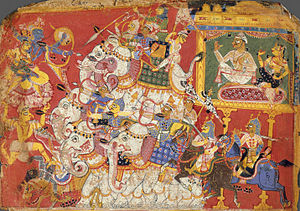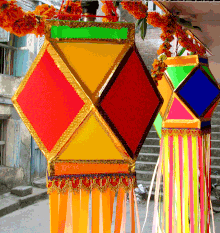Diwali (also spelled Divali in other countries) or Deepavali is popularly known as the festival of lights. It is an important five-day festival in Hinduism, Sikhism and Jainism, occurring between mid-October and mid-November. For most Hindus and Indians, Diwali is the most important festival of the year and is celebrated with families performing traditional activities together in their homes. Deepavali is an official holiday in India, Guyana, Trinidad & Tobago, Mauritius, Malaysia, Nepal, Singapore, Sri Lanka, Myanmar , Fiji , and Suriname.
The name Diwali is itself a contraction of the word Deepavali (Sanskrit: दीपावली Dīpāvali), which translates into row of lamps. Diwali involves the lighting of small clay lamps (diyas) (or Deep in Sanskrit: दीप) filled with oil to signify the triumph of good over evil. During Diwali celebrants wear new clothes and share sweets and snacks with family members and friends. Some Indian business communities begin the financial year on the first day of Diwali, hoping for prosperity the following year.
In Jainism, Diwali marks the attainment of moksha by Mahavira in 527 BC. In Sikhism, Deepavali commemorates the return of Guru Har Gobind Ji to Amritsar after freeing 52 Hindu kings imprisoned in Fort Gwalior by Emperor Jahangir; the people lit candles and diyas to celebrate his return. This is the reason Sikhs also refer to Deepavali as Bandi Chhorh Divas, "the day of release of detainees". Deepavali is considered a national festival in India and Nepal.
Deepavali is celebrated for five days according to the lunisolar Hindu Calendar. It begins in late Ashvin (between September and October) and ends in early Kartika (between October and November).

Krishna and Satyabhama fighting Narakasura's armies -Painting from the Metropolitan Museum
Hindus have several significant events associated with Diwali:
- The return of Sri Ram after 14 years of Vanvas (banishment). To welcome his return, candles were lit in rows of 20.
- The killing of Narakasura.
- Govardhan Puja is celebrated the day after Deepavali and is the day Krishna defeated Indra, the deity of thunder and rain.

Diwali being festival of lights, across India people celebrate it via symbolic diyas or kandils (colourful paper lanterns) as an integral part of Diwali decorations.

Rangoli, decorations made from coloured powder, is popular during Diwali
- Vasu Baras (27 Ashvin or 12 Krishna Paksha Ashvin): Baras means the 12th day and vasu means cow. On this day the cow and calf are worshiped.
- Dhanatrayodashi or Dhan teras or Dhanwantari Triodasi (8 Ashvin or 13 Krishna Paksha Ashvin): Dhan means wealth and Trayodashi means 13th day. This day falls on the 13th day of the second half of the lunar month. It is considered an auspicious day for buying utensils and gold. This day is regarded as the Jayanti of God Dhanvantri who came out during the churning of the great ocean by the gods and the demons.
- Naraka Chaturdashi (29 Ashvin or 14 Krishna Paksha Ashvin): Chaturdashi is the 14th day on which the demon Narakasura was killed by Krishna – an incarnation of Vishnu. It signifies the victory of good over evil and light over darkness (Gujarati: Kali Chaudas, Rajasthan : Roop Chaudas). In southern India, this is the actual day of festivities. Hindus wake up before dawn, have a fragrant oil bath and dress in new clothes. They light small lamps all around the house and draw elaborate kolams /rangolis outside their homes. They perform a special puja with offerings to Krishna or Vishnu, as he liberated the world from the demon Narakasura on this day. It is believed that taking a bath before sunrise, when the stars are still visible in the sky is equivalent to taking a bath in the holy Ganges. After the puja, children burst firecrackers heralding the defeat of the demon. As this is a day of rejoicing, many will have very elaborate breakfasts and lunches and meet family and friends.
- Lakshmi Puja (30 Ashvin or 15 Krishna Paksha Ashvin): Lakshmi Puja marks the most important day of Diwali celebrations in North India. Hindu homes worship Lakshmi, the goddess of wealth, and Ganesh, the God of auspicious beginnings, and then light lamps in the streets and homes to welcome prosperity and well-being.
- Bali Pratipada and Govardhan Puja (1 Kartika or 1 Shukla Paksha Kartika) : In North India, this day is celebrated as Govardhan Puja, also called Annakut, and is celebrated as the day Krishna – an incarnation of god Vishnu – defeated Indra and by the lifting of Govardhana hill to save his kinsmen and cattle from rain and floods. For Annakut, large quantities of food are decorated symbolizing the Govardhan hill lifted by Krishna. In Maharashtra, Tamil Nadu and Karnataka, it is celebrated as Bali-Pratipada or Bali Padyami. The day commemorates the victory of Vishnu in his dwarf form Vamana over the demon-king Bali, who was pushed to the nether-world, and the return of Bali to earth from the nether-world. In Maharashtra, it is called as Padava or Nava Diwas (new day). Men present gifts to their wives on this day. It is celebrated as the first day of the Vikram Samvat calender, in Gujarat.
- Bhaiduj (also Bhayyaduj, Bhaubeej or Bhayitika) (2 Kartika or 2 Shukla Paksha Kartika): on this day, brothers and sisters meet to express love and affection for each other (Gujarati: Bhai Bij, Bengali: Bhai Phota). It is based on a story when Yama, lord of Death, visited his sister Yami. Yami welcomed Yama with an Aarti and they had a feast together. Yama gave a gift to Yami while leaving as a token of his appreciation. So, the day is also called 'YAM DWITIYA'.
